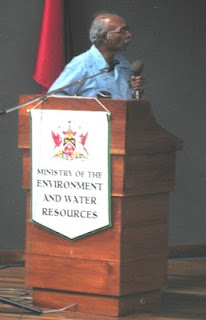The first session of the Plenary of the Intergovernmental Science-Policy Platform on Biodiversity and Ecosystem Services (IPBES-1) was held in Bonn, Germany from 21 to 26 January 2013. Trinidad and Tobago was represented by Dr Floyd Homer, Biodiversity Specialist at the Multilateral Environmental Agreements Unit of the Ministry of the Environment and Water Resources.
- Rules and procedures for the operations of the Plenary of the Platform
- Rules of procedure for meetings of the Plenary
- Initial work programme of the Platform
- Procedure for receiving and prioritizing requests put to the Platform
- Role of the Multidisciplinary Expert Panel
- Possible
institutional arrangements for the implementation of the work programme
During the session there was also an election of Officers of the Bureau of the Plenary of the Platform. This resulted in two persons from each of the regions represented being elected. The Bureau members for the Latin America and Caribbean region were Dr. Leonel Sierralta (Chile) and Dr. Spencer Thomas (Grenada).
Additionally, an election for members to the 25 person Multidisciplinary Expert Panel resulted in the following representatives from the Latin American and Caribbean Region: Dr. Sandra Myrna Diaz (Argentina), Dr. Carlos Alfredo Joly (Brazil), Mr. Edgar Selvin Perez (Guatemala), Dr. Julia Carabias Lillo (Mexico) and Dr. Floyd Homer (Trinidad and Tobago).
>> Further
details on the IPBES-1 meeting can be found at: http://www.ipbes.net/












